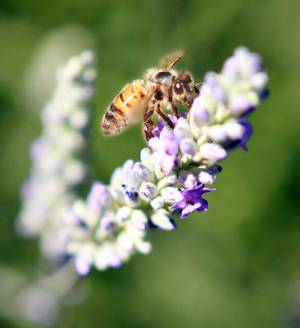Honeybees
Nashville, Ark. –
What can I plant to encourage honeybees to come pollinate my garden?
With the days getting longer and spring right around the corner, many people are hard at work in their gardens preparing for this year’s growing season. One common question that is asked is, “What can I plant to encourage honeybees to come pollinate my garden for me?” Truth be told, you can never plant enough for the bees. Honeybees are not typically too picky about what is planted just as long as they are able to get the nectar and/or pollen from the flowers. Just one colony may travel as far as 3 miles from its hive for food. This gives that colony more than 28 square miles to cover finding the best food source. Bees go out and scout the area around the hive and return back to let their nest mates know where to go find the best source of food. Wild and cultivated plants seem to be very popular among most honeybee colonies.
What are some favorite plants of honeybees?
Alfalfa, clover, basil, rosemary, sunflowers, dandelions, turnip greens, blackberries, and apple trees are a few of the honeybee’s favorites. One thing not to plant is the Bradford pear tree. It may be a pretty tree to look at, but it has become a true problem today.
When deciding on a strategy of what to plant, you should consider planting plants and trees that will bloom very early in the year and during the dry summer months. These are when honeybees have the most difficult time finding food. It is best to have an area that has a constant bloom throughout the growing season as well. When bees are out looking for food, they are looking for an area that has large patches of identical flowers and will often turn down an area that has lots of flowers but few of the same kind.
What color blooms attract honeybees?
Another thing to consider when deciding what to plant is that bees cannot see the color red. If possible, stay with colors like white, blue, yellow, and violet; these blooms honeybees can see. Honeybees do not see red light wavelengths, but they can see UV light. Humans cannot see UV lights, so bees are able to see thing differently than how we see them. Most flowers have patterns on UV-reflecting pigments called nectar guides that are used to attract pollinators. Most red blooming flowers are pollinated by butterflies and hummingbirds.
It is important to remember that no one plant is going to give a honeybee all the nutrients it requires. Colonies are healthiest when there is a wide variety of flowering plants planted, just be sure you plant many of each kind.
You can contact me for more information on what to plant to increase honeybees and other pollinators around your garden by sending an email to shorn@uada.edu. Howard County Extension office is still working and is there for all the residences in Howard County during this time.
By Samantha Horn
County Extension Agent - Agriculture
The Cooperative Extension Service
U of A System Division of Agriculture
Media Contact: Samantha Horn
County Extension Agent - Agriculture
U of A Division of Agriculture
Cooperative Extension Service
421 N. Main Nashville AR 71852
(870) 845-7517
shorn@uada.edu
Related Links
The Arkansas Cooperative Extension Service is an equal opportunity institution. If
you require a reasonable accommodation to participate or need materials in another
format, please contact your County Extension office (or other appropriate office)
as soon as possible. Dial 711 for Arkansas Relay.
Pursuant to 7 CFR § 15.3, the University of Arkansas System Division of Agriculture
offers all its Extension and Research programs and services (including employment)
without regard to race, color, sex, national origin, religion, age, disability, marital
or veteran status, genetic information, sexual preference, pregnancy or any other
legally protected status, and is an equal opportunity institution.
